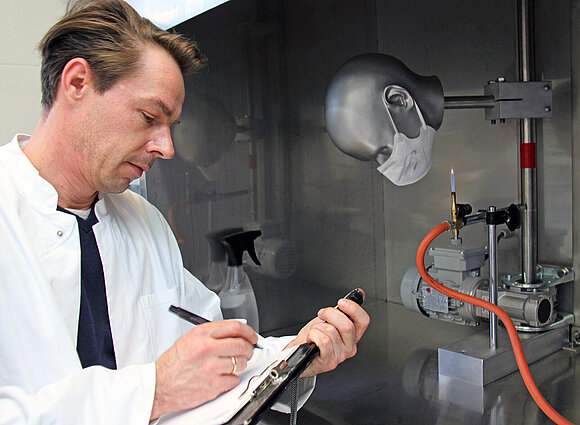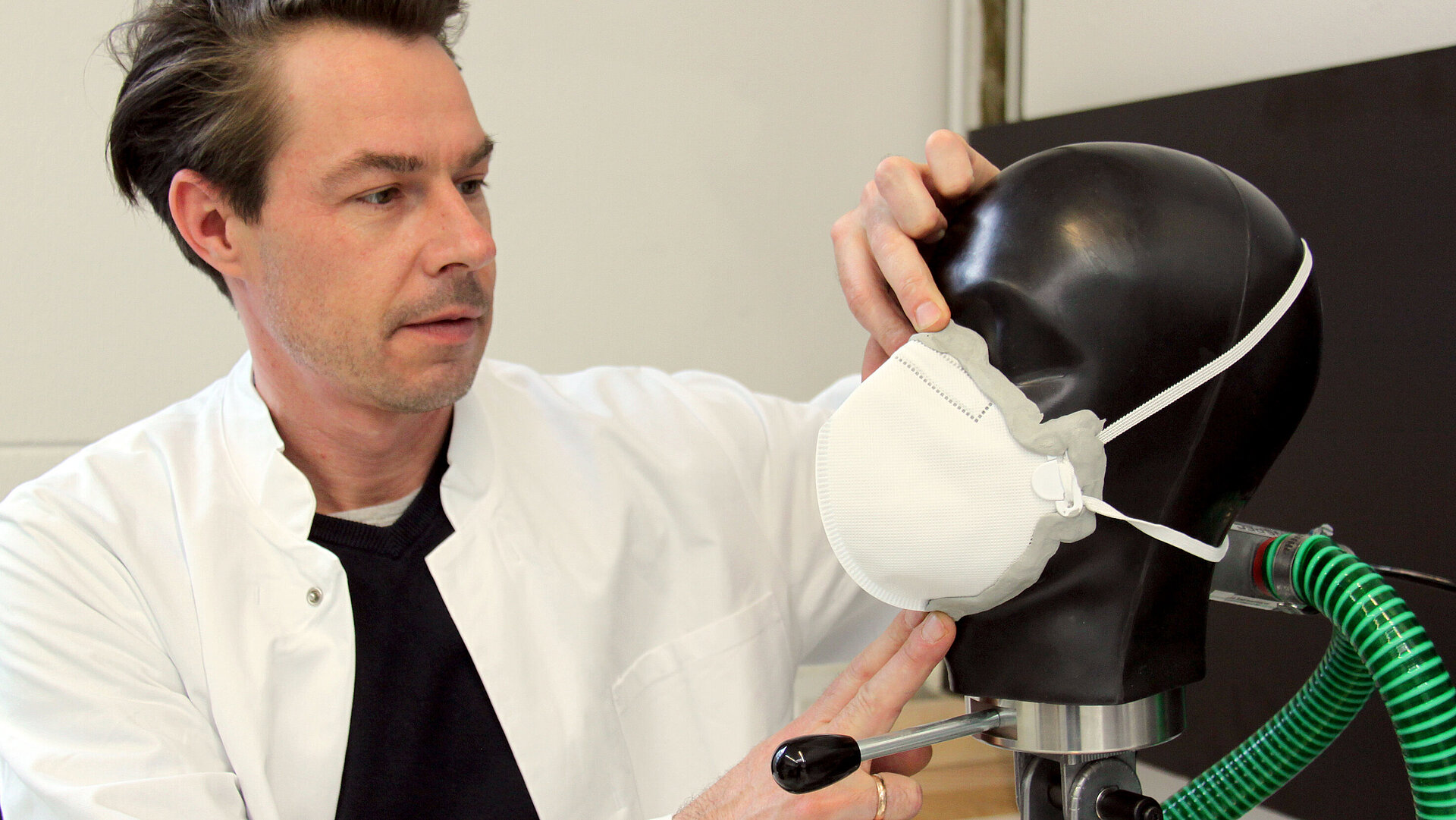EU type test, certification and tests for quality assurance
Safe and usable respirators are also in demand after the COVID pandemic. Experience shows: Quality prevails.
As a notified body (NB 0757) according to the PPE Regulation (EU) 2016/425, ift Rosenheim offers type tests as well as certification for respirators (e.g. FFP2). In addition, independent tests for quality assurance of particle-filtering masks can be carried out based on EN 149.
Contact us - our test equipment is ready for your particle-filtering masks!
Important Information - short + concise
- The technical test duration including documentation is 5 to 7 working days for quality tests and approx. 15 working days for a type test according to EN 149.
- We will be pleased to coordinate the quantity of test specimens and the further procedure with you personally.
- Please do not supply us with respirators without being asked.
- For new clients: To simplify processing, please send us our customer data sheet already filled out.
- You will find the answers to frequently asked questions in our FAQ.
Advantages at a glance
Test and Certification of FFP1, FFP2 and FFP3 Masks (EN 149)
ift Rosenheim is notified as a test and certification body for respiratory protective devices as well as particle filtering half masks with/without valves according to PPE Regulation. This means that your particle filtering half masks (FFP1, FFP2 and FFP3) can be tested, certified and monitored.
Respirators are classified in risk category III of the PPE Regulation (EU) 2016/425. Accordingly, they must undergo the most stringent conformity evaluation procedure in order for manufacturers to be allowed to affix the CE mark. Therefore, in addition to the EU-type test (Module B/Annex V), one of the following modules is required as a prerequisite for CE marking:
- Module C2/Annex VII: Internal production control with monitored product tests at irregular intervals by ift Rosenheim (as notified body),
- Module D/Annex VIII: Quality assurance system for the production process, monitored by ift Rosenheim (as notified body).
Then you as the manufacturer can affix the CE marking (CE 0757) to your respirator.


Quality Assurance of Respirators
In order to prove the quality of the respirators you have purchased or to check the consistent product quality, ift Rosenheim offers a test based on EN 149. The quality assurance can be carried out completely or on individual characteristics, such as penetration of filter material. We would be pleased to put together an individual test plan for you.
This allows clients (e.g. hospitals, consumer protection, associations or authorities) to independently and impartially ensure the consistent product quality of the respirators they use and to create sustainable confidence in the product among end consumers. The tests are carried out within a few days. You will then receive a qualified test result for your respirators at short notice.
More information on this effect can be found in the "Testing method for quality assurance" (in German).
FAQ - Frequently Asked Questions about Test of Respirators
Before submitting an enquiry to ift Rosenheim, please check whether your product is eligible for the test. Information on the distinction between product types can be found here:
- Recommendations for the use of homemade masks (Federal Institute for Drugs and Medical Devices - BfArM) (in German),
- Differentiation between mouth-nose protection and particle-filtering respiratory protection (Bavarian State Office for Health and Food Safety) (in German),
- The market surveillance authorities responsible to determine the marketability of personal protective equipment in the Federal Republic of Germany. You can search for the market surveillance authorities responsible for you via this link (for Directive: Directive on Personal Protective Equipment).
Personal protective equipment (PPE) is divided into three different risk categories. These risk categories determine which conformity evaluation procedure must be applied.
The PPE Regulation specifies the following risk categories:
- Category I
Category I includes only minor risks, such as superficial mechanical injuries, contact with mildly aggressive cleaning agents and/or prolonged contact with water or damage to the eyes from solar radiation (selection of risks). Products that fall into this category include, for example, gardening gloves, work aprons or sunglasses.
- Category II
Category II includes risks that are not listed under Category I or Category III. Examples include safety shoes, safety helmets or hearing protection.
- Category III
This category includes risks that can lead to very serious consequences such as death or irreversible damage to health. PPE in this category protects, for example, against hazardous substances, ionizing radiation, very cold or warm environments, falls or noise.
Respirators belong to category III and must therefore undergo the most stringent conformity evaluation procedure in order for manufacturers to be allowed to affix the CE mark.
Particle filtering half masks placed on the EU market must be declared with a CE mark. ift Rosenheim is one of the few bodies in Germany notified according to PPE regulation that can provide the necessary tests, certifications and evidences. Then, as the manufacturer, distributor or EU authorised representative, you can affix the CE marking and thereby declare that the product complies with the appropriate requirements.
Respirators tested and certified by ift Rosenheim can be identified by the CE mark with the number NB 0757. It is mandatory that this number is affixed to the mask. All notified bodies are listed in the NANDO database of the European Union. This allows consumers to check whether the Notified Body indicated on the respirator is authorized to review so-called "Personal Protective Equipment (PPE)".
In addition, companies that have tested their particle filtering masks at ift Rosenheim receive an ift-tested mark with an individual customer ID. The mark can be affixed to the product, packaging or advertising material for promotional purposes. On the website www.ift-tested.de a review of the authenticity is possible. This makes the mark forgery-proof and increases end customer trust.
What we need from you for the test
We coordinate everything you need with you - individually tailored to your test program.
Contact us!
